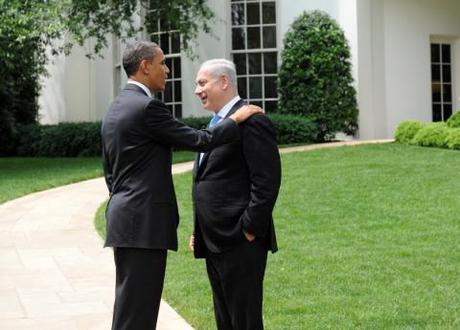
Prime Minister Benjamin Netanyahu and President Barack Obama . Photo credit: Avi Ohayun.
Israel’s patience with diplomatic efforts to deal with Iran’s nuclear programme is running out, Israeli Prime Minister Benjamin Netanyahu has warned, increasing fears of military action in the region. “Israel has waited patiently waited for the international community to resolve this issue. We’ve waited for diplomacy to work… None of us can afford to wait much longer,” said Netanyahu, reported CNN. Iran has repeatedly insisted that its nuclear programme is for energy, rather than military, purposes.
The Israeli PM’s comments came after he met with US President Barack Obama on Monday to discuss the situation in Iran. While Obama currently remains committed to a diplomatic solution, including a suite of sanctions against the country, the President did not rule out future military action to prevent Tehran from developing a nuclear weapon. Israel, however, has adopted a harder stance over the last few months, after the country accused Iran of orchestrating a bombing campaign against Israeli diplomats in Thailand, Georgia and India.
“We’re together. … Israel and America stand together,” said Netanyahu after the White House meeting. But how long can this last in the face of Israeli impatience? Is there a chance Israel will choose to strike against Iran without the US?
Playing into the hands of hardliners. “An Israeli attack may be exactly what Tehran’s most hard-line leaders have been trying to provoke,” reported Aram Roston for The Daily Beast. Roston quoted former CIA officer Marty Martin as saying Tehran’s ultra-militant leaders hope to “goad” Israel into war in order to distract from internal problems in Iran. “Iran’s internal troubles include a 12 percent unemployment rate, a shattered economy (due in part to international sanctions), resentment over the oppressive regime, and widespread disgust over corruption,” Roston wrote. An Israeli attack would unite the country against an outside enemy and shore up support for the regime.
No evidence of nuclear weapons. It is crucial to bear in mind that, despite suspicions, there is no evidence Iran is developing a nuclear weapon, said a Guardian editorial: “To launch a full-scale war in the Middle East on the basis of a hunch, would be folly itself.” Obama needs to stand firm in the face of Israeli agitating for an attack, argued the editorial, and maintain the current US stance: “To prevent Iran from acquiring a nuclear weapon, not the capacity to build one.”
Israel and US: Not official allies. “America has no treaty obligation to come to Israel’s defense as it does with many countries in Europe and Asia,” pointed out a Christian Science Monitor editorial; and this lack of a formal defence alliance makes negotiations between the US and Israel on how to deal with Iran even more difficult. According to the editorial, “Finding a peaceful way to neutralize Iran’s nuclear threat requires that Israel and the US first bring greater clarity to their own relationship.” While Israel may be pushing for military action, the country realises the US involvement is key: “[Israel] may not have the military means to destroy Iran’s nuclear facilities unless the US is involved. And it could also lack the defensive capability to withstand an Iranian counterattack.”
Hawk talk. Writing in The Washington Post, Republican presidential hopeful Mitt Romney criticised Obama’s stance on Iran, arguing that the president’s policy sets the stage for an Iranian nuclear weapon. Romney suggested ever-tighter sanctions against Iran, along with the threat of military action: “My foreign policy plan to avert this catastrophe is plain: Either the ayatollahs will get the message, or they will learn some very painful lessons about the meaning of American resolve.” The GOP candidate also called for stronger support of Israel: “I will make clear that America’s commitment to Israel’s security and survival is absolute. I will demonstrate our commitment to the world by making Jerusalem the destination of my first foreign trip.”
US military action possible, but undesirable. “Mitt Romney’s claim that ‘if Barack Obama gets re-elected, Iran will have a nuclear weapon’ is purely cynical; his own prescription for ‘crippling sanctions’ and ‘military options’ barely differs from Mr. Obama’s policy,” argued a New York Times editorial. Nobody knows whether sanctions and diplomacy will prevent Iran from building a nuclear weapon; but nobody should doubt the president’s commitment to military action, albeit as a last resort. “The United States military is far more capable of doing serious damage to Iran’s facilities than the Israeli military, but the cost would still be high, with many of the same dangers and uncertainties,” said the editorial.

